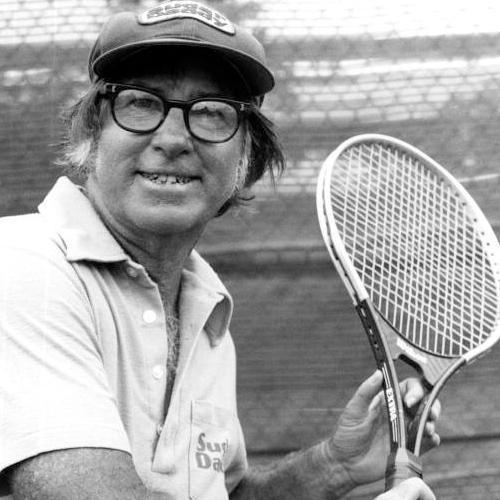Bobby Riggs (Robert Larimore Riggs)

After the war, as a professional, Bobby Riggs won the US Pro titles in 1946, 1947, and 1949, beating Don Budge in all three finals. In the 1946 tour against Budge, Riggs won 24 matches and lost 22, plus 1 match tied at Birmingham, Alabama establishing himself as the best player in the world (source : American Lawn Tennis July 15, 1946, page 34). The next year, according to some sources, he beat Budge again by the same narrow margin. But other sources say that he played Budge infrequently and that his primary tour was against Frank Kovacs, whom he beat 11 matches to 10. Budge had sustained an injury to his right shoulder in a military training exercise during the war and had never fully recovered his earlier flexibility. Now, in 1947, according to Kramer, “Bobby played to Budge’s shoulder, lobbed him to death, won the first twelve matches, thirteen out of the first fourteen, and then hung on to beat Budge, twenty-four matches to twenty-two.” Kramer himself, however, had a sensational 1947 as an amateur and it is debatable whether he or Riggs was actually the top player for the year (both players met three times at the end of December on fast indoor courts, Riggs won two matches). The promoter of the two Riggs-Budge tours was Jack Harris. In mid-1947, he had already made a deal with Kramer that he would turn professional after the U.S. Championships, regardless of whether he was the winner. He also told Riggs and Budge that the winner of the Professional American Singles Championship, to be held at Forest Hills, would establish the World Champion who would defend his title against Kramer. For the second year in a row, Riggs defeated Budge. Harris signed Kramer for 35 percent of the gross receipts and offered 20 percent to Riggs. He then changed his mind, as Riggs recounted in his autobiography, “saying he could get Ted Schroeder as one of the supporting pair, provided both Kramer and I would yield 2½ percent of our shares in order to build up the offer to Ted. We both agreed — and then Schroeder refused.” Harris then signed Pancho Segura and Dinny Pails at $300 ($3,220 today) per week to play the opening match of the Riggs-Kramer tour. Riggs then went on to play Kramer for 17½ percent of the gross receipts.
On December 26, 1947, Kramer and Bobby Riggs embarked on their long tour, beginning with an easy victory by Riggs in front of 15,000 people, who had made their way to Madison Square Garden in New York City in spite of a record snowstorm, that had brought the city to a standstill. On January 16, 1948, Bobby Riggs led 8 matches to 6. At the end of 26 matches, Riggs and Kramer had each won 13. By that point, however, Kramer had stepped up his second serve to take advantage of the fast indoor courts they played on and was now able to keep Riggs from advancing to the net. Kramer had also begun the tour by playing a large part of each match from the baseline. Finally realizing that he could only beat Riggs from the net, he changed his style of game and began coming to the net on every point. Riggs was unable to handle Kramer’s overwhelming power game. For the rest of the tour Kramer dominated Riggs mercilessly, winning 56 out of the last 63 matches. The final score was 69 victories for Kramer versus 20 for Riggs, the last time an amateur champion has beaten the reigning professional king on their first tour. In many of the last matches, it was assumed by observers that Riggs frequently gave up after falling behind and let Kramer run out the victory. Riggs says in his autobiography that Kramer had made “nearly a hundred thousand dollars … on the American tour alone, while I took in nearly fifty thousand as my share.” In spite of still beating the great professionals such as Pancho Segura, Pancho Gonzales, Jack Kramer or Frank Kovacs in the following years, Riggs soon retired from competitive tennis and briefly took over the job of promoting the professional game. As a senior player in his 60s and 70s, Riggs won numerous national titles within various age groups. Bobby Riggs was diagnosed with prostate cancer in 1988. He and Lornie Kuhle founded the Bobby Riggs Tennis Club and Museum to increase awareness of the disease and house his memoirs/trophies. Riggs died on October 25, 1995, at his home in Leucadia, Encinitas, California, aged 77.
Born
- February, 25, 1918
- USA
- Los Angeles, California
Died
- October, 25, 1995
- USA
- Leucadia, Encinitas, California
Cause of Death
- prostate cancer
Cemetery
- Nassau Knolls Cemetery
- Port Washington, New York
- USA

